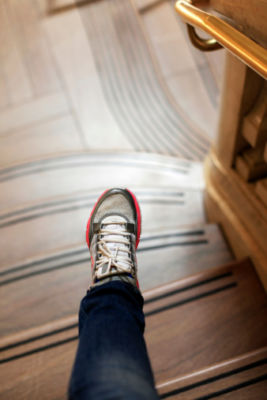


When you slip and fall at a bar or restaurant, how do show it was the company's fault? What does it take to prove your premises liability lawsuit? A recent Michigan Supreme Court decision says it's up to the patron to show that the establishment did something wrong.
In a premises liability case, you are claiming that you were injured because the owner of the property didn't take reasonable care of his or her facility. But you have to do more than show that you got hurt while you were there. In Lowrey v LMPS & LMPJ, Inc., the Court set the standard for what an injured patron needs to prove.
Krystal Lowrey was celebrating St. Patrick's Day at Woody's Diner. The restaurant has two stories. Lowrey and her friends were drinking and dancing on the second floor. They used the back stairs several times over night to access the smoking patio, all without incident. But then, on her way out at 1:45 a.m. Lowrey fell down the last five stairs and broke her leg.
When Lowrey landed at the base of the stairs, her backside was wet. Believing she "can't just slip on nothing", Lowrey assumed that the stairs had been wet. She sued Woody's for her injuries based on premises liability.
Lowrey and her friends weren't the only ones celebrating that night. But no one, from guests to Woody's employees, had seen water on the stairs. Even Lowrey couldn't remember seeing a puddle.
Wet stairs, puddles, and slippery floors can sometimes count as hazardous conditions that can be the basis of a premises liability case. However, to prove their case, injured patrons have to show that the property owner knew of the condition and failed to do something about it.
This is the issue that brought Lowrey's case before Michigan's highest court. The appeals court said that even though Lowrey wasn't able to show that the hazardous condition existed, her case could continue. The Court of Appeals judges said that the company had to present evidence that it had done a reasonable inspection, which hadn't revealed the hazard.
The Michigan Supreme Court said that the Court of Appeals had it backwards. The injured party, not the company, has the "burden of proof." The Court said:
However, this Court has never required a defendant to present evidence of a routine or reasonable inspection under the instant circumstances to prove a premises owner's lack of constructive notice of a dangerous condition on its property.
The case could only go forward if the injured party presented evidence that the company had "actual or constructive knowledge" of the hazard. It was up to Lowrey to present evidence that Woody's knew about the wet stairs, or that the hazard existed for an unreasonable period of time. She was not allowed to rely on bare allegations without any evidence that there was water or some other hazardous condition on the stairs.
Michigan law doesn't make it easy for injured patrons to get relief from negligent property owners. Rather than rely on assumptions about what "must" be true, you and your personal injury attorney will need to provide evidence of the hazardous condition and the property owner's failure to address it. If you have been injured because a business failed to keep their premises clean and safe, you need an experienced personal injury attorney to help you prove your case.
At Sachs Waldman, we have extensive experience helping the victims of premises liability accidents recover damages from negligent property owners. We know what to do to make sure you are compensated for your injury, without relying on assumptions. Contact our Detroit personal injury law office at 1-800-638-6722.
© 2024 Michigan Injury Attorneys
View Our Disclaimer | Privacy Policy
Detroit Personal Injury & Car Accident Attorneys